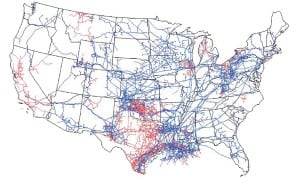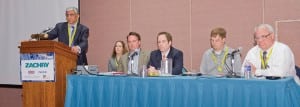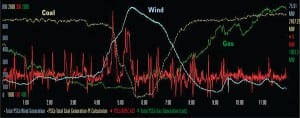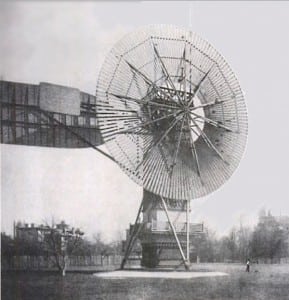Wind
-
Gas
Who Pays for Firming Up Variable Energy Resources?
The major economic hurdle for renewable power generation technologies continues to be substantial installation costs. But another cost is associated with continuous load-balancing, made possible by backstopping that variable generation with dispatchable generators that typically consume expensive fossil fuels. Bottom line: Who pays for the capacity firming or backstopping resources?
-
Coal
Consolidation, Market Distortions Underlie Remarks by Industry Executives
If you needed additional proof that the power industry is changing, the ELECTRIC POWER keynote and panel discussions over the past few years have provided it—top-of-mind issues have been significantly different each year. For the 2011 keynote speaker and panelists, the challenges of reliability, regulatory compliance, financing, and getting the fuel mix right took center stage. In the wake of Japan’s nuclear crisis, safety also featured prominently.
-
Solar
Utilities Increase Renewable Energy Capacity
Driven by state RPS requirements and the desire to diversify their energy sources, U.S. utilities continue to add more renewable power to their generation portfolios. As a result, they must deal with a number of important issues, including resource availability that varies geographically.
-
Wind
Charting the Wind: Where the Sector Is Headed
Perhaps the most echoed sentiment at the American Wind Energy Association’s (AWEA’s) WINDPOWER 2011 Conference & Exhibition, which took place May 22 to 25 in Anaheim, Calif., was the call to extend the Production Tax Credit (PTC), the industry’s policy driver, before it expires at the end of 2012. But that wasn’t the only theme. The throngs of companies and organizations that are shaping the rapidly emerging sector around the world had different notions of the factors that help or hinder the growth of wind power, and POWER was there to listen to their perspectives about everything from grid integration, to offshore energy, to technology innovation.
-
Solar
Countries Abandon Subsidies for Renewables en Masse
Stricken by the economic crisis and forced to implement austerity measures, several countries around the world have been forced to abandon or slash subsidies for renewable power producers.
-
Coal
Spain: A Renewable Kingdom
Spain has served as both exemplar and scapegoat when it comes to renewable energy policy. Though power policy must necessarily accommodate specific national resources and goals, Spain’s experience as an early and eager adopter of renewable energy technologies and subsidies is a cautionary tale of how the best intentions can have unintended consequences.
-
Wind
Major Offshore Players Introduce Colossal Wind Turbines
Competition among offshore wind turbine vendors vying for market share went into overdrive in the first three months of 2011 as several key players announced gigantic new turbine models.
-
Wind
Horizontal or Vertical? The Question for Wind Turbine Axis Orientation
This web supplement to "Changing Winds: The Evolving Wind Turbine" examines the debate over the merits of the two most common wind turbine axis orientations.
-
Solar
Energy Storage Enables Just-in-Time Generation
One of the main criticisms of renewable energy facilities is that they are unable to dispatch electricity when it’s needed. The great game-changer is low-cost energy storage, which would enable renewable energy production to be stored and rapidly released when needed. Here are seven promising distributed energy storage technologies that could be commercialized in the near future.
-
Wind
Changing Winds: The Evolving Wind Turbine
As early as the first century A.D., wind energy was harnessed for practical purposes. Since then, turbine designs have come a long way from the archetypal post-mounted four-bladed devices. Today’s ubiquitous three-bladed designs will soon be evolving in many unexpected directions.







